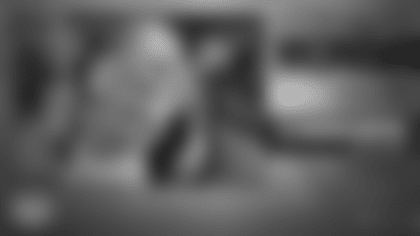Washington Commanders head coach Dan Quinn addressed the media before practice on Aug. 21. Here is a full transcript of the press conference.
Opening Statement:
"As we get started today, you'll see some themes at practice regarding competition, us going against one another. So Monday is really about what we call 'Tell the Truth Monday', the things that we wanted to see from the game. What'd you emphasize? What'd you like? And then today we call it 'Competition Wednesday'. We'll have some good-on-good work, skills together to get sharper and sharper, and that'll be all the way throughout the season. And as we get into the rest of the week, some of the themes will go, but you'll see at practice today, really a lot of good-on-good, and that'll be the case for today and for tomorrow before we shift gears on Friday into preparation for Sunday night. So all that said, wanted to get it rolling with you guys to give you a little insight into how we have a philosophy for the week. Each day has its own theme, Tell the Truth, Competition, tomorrow will be About the ball. Friday you'll see a lot of things about finishing and some game management moments and end of the game plays. So each of the day just staying into that process for that day."
On S Tyler Owens performance on defense and special teams:
"Yeah, I've really been proud of the effort that he's put forth when we were really saying, 'Hey, looking for competitive plays, looking for guys that were absolutely going for it. It was cool to see Saturday night, him absolutely emptying the tank, both defensively and on special teams. So he's really been hitting his stride."
On DT Jer'Zhan Newton's injury:
"Yep. So, he has a, dealing with like a soft tissue injury on his foot, not related to his surgery. And so he's off to the side doing work and we're fortunate that the, I'm going to call it a preseason bye [week] is here because we're going to try to ramp him up towards the end of this week and hopefully into the practice for next week. So, he's hit all the marks that we're wanting him to, but we're just trying to make sure there are no setbacks. He worked so hard, so I want to make sure like we just don't miss one thing of it."
On Week 1 mindset and philosophy reflected through practice schedule:
"The philosophy change is I wanted them to have the schedule of that, of special teams meeting being at this time, this is when we're lifting, walkthroughs to go with our same format of competing against one another. So you're right in the fact that this is the flow of what an in-season Wednesday will look like, tomorrow a Thursday and then do a Friday. But as far as what we would do on the field, we're not game planning on the next couple days, but you're right that the schedule will mock what we'll do in the regular season weeks."
On the drawbacks of minimal roster cuts until after training camp:
"No, I don't. I don't find the drawback in it because I do think there's value in finding that last piece, and so maybe the old days it was the fourth preseason game. Nowadays, it's the third where there's more to see and I would say from the roster spot, from the forties through 53 [man roster] and when we get towards the end of the week, we'll talk about New England into next week and you'll here us talk about a 70-man roster now that the practice squad has expanded and you have veterans, you have call ups. So we're kind of thinking even in a bigger picture than the 53. So I don't find the downside to it because a number of the people that you have here are going to be some ones that you're going to want to continue to work with moving forward either on the roster or on the practice squad. So no downside for me in that space."
On DE KJ Henry and DE Andre Jones Jr. performances in preseason games:
"Yeah, I think what you're seeing at defensive end and we play out on the edge a lot. We're really trying to bring the speed and the edge setting ability, and I've seen that from those guys. As the edge players, all downs, first, second and third downs, the special teams roles for those guys. But really more than anything I've just seen like their relentless style, their nature of how they want to go play. The play style is so important to us and both of those two have really embodied 'all I can do to make that happen', and so I've been very pleased with both of them."
On what he likes from the offensive line:
"What I do like is finding the versatility of players into this spot. If we use [T] Trent [Scott] as an example, he's taken snaps at right tackle, left tackle, we'll put him inside the guard to work him in that. You've seen [G Chris] Paul from outside to inside. So finding the versatility of who could be a swing tackle, who could also play guard and center. So finding the versatility, that's the really big key to this as far as combinations and people working together, you just need more of that like always. But, I am pleased to see during this time of year you have to put guys into different spots because that's really the only way that you're going to know both in practice and in the game."
On having patience when coaching and developing a rookie quarterback:
"Yeah, I think it's not just at that position, it's overall, but I think you're on the right target to say anytime there's development, there's marks that you go up and down, up and down. And so, not just related to quarterback, but we're kind of growing things we saw better from preseason one into preseason two and again for this week. So it's kind of part of that process, so I would say that is one area I'm not as impatient because I expect those to take place. So you may hear me use the term expect the expected, there's gonna be bumps, there's gonna be missed turns that you need and quite honestly, you don't want them to, but you know that it's an important part of the process."
On how LB Bobby Wagner has evolved since leaving the Seattle Seahawks:
"Yeah, what a remarkable competitor he is. And I think that was probably one of the first things, that I remember way back of meeting him. I was in Seattle two different times and it was one of the spaces in between that the team drafted him, so I got to start maybe when his second year with him. And just the details that he would go to the willingness to get it right. And he was just always so consistent, even as a second-year player, you may have thought he had already been in the league four or five years. So he had this consistency and professionalism about him that showed people they could really rely on him very early. And now you see that he's sharing that information with others. And if you were to sit in the linebacker room, you would see them asking him or what is that process like? Just the smallest of the details. So what I have seen is just, he's a remarkable tackler. He's got instincts, but, all the really good linebackers who are good tacklers or safeties for that matter can play square. And if you're watching the film of Wags, you barely see him out of position and he plays square, he is a sure tackler, but just it's the angles, the tracking. It's like probably watching like in basketball a good shooter or in baseball, a good hitter. He is a remarkable tackler, and he takes the right angles, the right tracks to go to it, and so, he's always been somebody that I look for in that example."
On key evaluations leading up to final roster cuts:
"This may sound unusual, but we're really looking for consistency because sometimes when a person can be into this spot or a ball player, they could press to really want to show out or I wanna make this play, I wanna do something to stand out. And so being tighter doesn't allow you to play better. It just can make you a little tighter and more anxious about the play. So we're really trying to make sure we're staying into the flow of how we do things, and there may be some higher reps on a special teams portion or lower and higher on offense or defense. So you'll see some shifting going on because there may be one phase of the game that we wanted to see more than another. So for instance, let's say a guy played a lot of snaps last week on offensive defense. He may play less that way and more on the specialty side to have that evaluation come true. So we're being as thoughtful as we can to make sure we're putting guys into the right spots to see if they can make those plays. Sometimes we'll feature some plays, not that the blitz has to go to a certain player, or the ball has to go to a certain player, but there are some moments where you want to feature some plays and if it works out that they get their opportunity to do something, you have to, I wouldn't say it's scripted, but it's intentional. And then same way on the offense and defensive side, there might have been somebody that played quite a bit on special teams and have really demonstrated their value there and then now playing them more on offense or defense. So there's a little bit of a battle rhythm that will go customized by player."
On if there is a position group that has been harder to evaluate for cuts:
"I thought two of the groups that have really stood out to me, just been consistent and deep are at safety and at tight end, and just the practice habits, the willingness to go for their battles on special teams. So those have been two that have stood out to me of consistently high-level effort, guys supporting one another. And so that's what you want as a coach where there's really challenging spots and guys really pushing it. And I'd say those are two of the positions that that jump out to me."
On the value of designating days with names:
"I think it can just help you lock into where you don't have to worry about the game. You just lock into today. The competing part really is, it's us going against one another to really sharpen our skills and there could be a competition that's not scripted, just a third down competition. For instance, you'll see today, different down and distances. The coaches, the players all have to react into that moment, but more than anything, it's helping one another be at their best. And that's what I like about it. If we can really compete against ourselves to whatever the pass bar was, to see if we can take it further and against one another, the whole room can kind of just lift. So, you don't have to go into the game, in that space now. Today's about getting better and worrying about us and the things that we need to do. And then as tomorrow comes, there'll be a big emphasis on the ball and it just allows you to stay into those topics. And we do that right over the three or four days, not only will we be prepared, we'll also be ready. And I think there's a difference between the two. Prepared, you're organized, you have it together, but being ready and I can't wait for this game, I can't wait for this moment because I did all these things, and then. So, that's what today looks like."
On if it feels like crunch time and on how he's attacking the last week of training camp:
"Not yet. I actually do enjoy this week. It's a tricky one, because emotions are at different spaces and it's one of the more challenging ones as a coach. Some may know, 'Hey, I'm not going to play a lot in this game.' Others may know, 'Hey, this is my real chance to go do my thing and show this organization one last time what I'm about.' So, it's tricky, but I also love it because as you go through it and it gets into the really hard moments in the game, you really find out who's about it? I saw some of that in Miami on the sideline of when it got really tough, who was really ready to smile and keep bringing some more on. Those are the moments this week and last week that I look for and they just kind of reveal themselves through the week and especially in the games."
On if he's been pleased with the team's competition level:
"I have and that's always been the goal, to make sure when decision-making time comes that you've done all the work you can to really put your best foot forward. We wanted to make sure we were always demonstrating that, that's what we're going to be about this year, 10 years from now, and down the line. To say, coming here, this is what we stand for. And knowing that it's not for everybody, but for the ones that demonstrate that, and show that, or about that, then they're going to have an excellent chance to do well in this program."
On ways the rookies have developed off the field:
"We call them work-ons. They have to put down something specific that you can measure to get better at. And that could be demonstrated footwork, could be something different about a specific pass route, might be different tackling technique for somebody. But each of the players have something that you'll see them, that's part of their work on. Could be done pre- or post-practice. For instance, today we showed some of those work-ons from the game in Miami. Here's somebody that was wanting to work their footwork at the top of a route. And then I showed that example from the game. I wanted to show the work-ons that you're doing, it's making a difference in your play. You can't have 10 things to do to get better, but if you can lock in on, 'I want to get better at this one thing,' it makes it a lot easier to hone in on that. And that's our job as coaches, to help them find drill work for that, tape emphasis, to make it come to life."
*On Defensive Coordinator Joe Whitt Jr. and if he's noticed a difference with his title change: *"Well, I think first thing, he's a remarkable teacher. There's very few mental errors that are taking place out on the field. That's a good sign that not only is the teaching gone well, but the learning has. Sometimes you can do good teaching if it's a lecture and you think I did a good job today and the learning's not so good. And what I'm seeing is we've tested the learning and it allows the guys to do their thing at full speed. And if we can do that over and over again, and your skills just get sharper and sharper to go, Whitt was done a good job of trying to figure out during offseason in training camp, who could be featured man-to-man's, not blitzing, who plays off, who plays down. There's some trial and error that goes with that to actually put yourself into the space to find out and make it hard. And then, 'Okay, I gained the information, now I can apply it.' So, I think he's done a good job of that. He's really organized, has clear vision of how he wants to play the guys calling the game. So, he's off to a great start."
On where he finds the differentiators on special teams:
"Yeah, it's a good question because I think there's a little bit of both. You'll hear special teams coaches or head coaches talk about the big four, which is punt, punt return, kickoff and kickoff return. To be a core four player, boy you better be good in space and have speed, because those fourth downplays on punt, punt return, the kickoff now, and kickoff return ramped up. Can I make plays in space? So, there'll be some players that will have a featured role mostly on special teams. Now that could be one or two offensive players or defensive players where they may not have a leading role on offense or defense. Then, there's the player that has roles on both. I may be a backup or a complimentary starter. I'm playing 50% of the plays. And then you may hear a guy, we'll play them on two of the four. I can play them on punt and kickoff return. So, first level is the [S] Jeremy Reaves' of the world that's just established, has it. Special teams value impacting plays, then it gets into the player that's the complimentary starter that plays quite a bit but still has room for at least two phases. The fun part, what's going to happen in 2024 is, which two of the phases have been, let's call it somewhat dormant for a few years. They are growing again and it's really cool to see. It's still work in progress I would say, and I think it will be a little bit fluid as it goes into the beginning part of the season. But I am excited to see it and I think it's really good for not just the Jeremy Reeves' of the world who make their mark on special teams, but also just for the energy of the game, the players, how we do things. I'm really pumped about it."
On how he evaluates college players for special teams roles:
"Yeah, because you're right that if they're playing a lot in college, they're probably not playing a lot on special teams. The rookie player that you're developing on special teams, you have to remind them, 'Man, this is just football. This is just like making a tackle or running a route. This is how you do it.' For the offensive players, we spend some extra time on tackling to make sure we're not leading with our head, we're leading with our shoulder because that's the person that we're trying to train even more. They don't spend a lot of time on tackling. Talk about the wide receiver who plays on special teams, we don't want them leading with their head. Own with leverage, hit with your shoulder. So, today we had a big presentation on tackling and breaking tackles and we do it for the whole team, not just for the defense because we recognize on the [special] team[s] side of things that's going to be there. We've tried to make sure we have a vision for every player that we bring in. What they can do, where their skills are. It takes a while, but coming in if you see a certain speed or a certain length, you say I think he could be a wing in punt. I think he could be a returner. I think he would be an interior guy on punt return. You try to find unique things and then make that come to life. Because quite honestly, the rookies don't have a vision for what their special teams is going to look like. It's up to us to show them what that vision can be and look like. And I think [S] Tyler's [Owens] done a good job of that and so have some others. But as a rookie, he's demonstrating that kind of speed and physicality."













